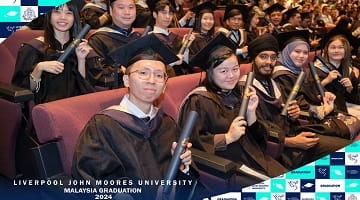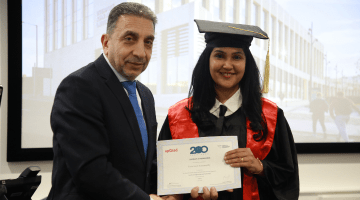About this course
This Advanced Practice course combines theoretical learning of business and management from a global perspective, along with the application of practical skills.
- Develop the skills and knowledge required for a successful career in international business management
- Students are actively encouraged to publish their Masters projects and research findings in Postgraduate Journal of Management Research to enhance their professional and academic development
- Enjoy a rich cultural experience working alongside students from around the world, offering a great opportunity to expand your cross-cultural communication skills and understanding different global business perspectives
- Designed to be inclusive and supportive to international students to cultivate a positive learning experience
- Benefit from innovative learning and teaching approaches applying theoretical concepts through contemporary business simulations
- Study in Liverpool, a key city for international business and trade and a truly global commercial setting
- This course is also available as a 2 year MSc with Advanced Practice which includes a Business Consultancy Project supported by industry mentors
- 'Microeconomics of Competitiveness' module designed by Harvard Business School and delivered by Dr Moustafa Haj Youssef, an official affiliate of the MOC-Harvard network.
This course will open up a wealth of global opportunities providing the range of knowledge necessary to negotiate between countries, cultures, political and economic systems and other commercial borders.
Completing this MSc will take you to the next level of academic achievement. You will develop your skills in leadership and strategy, and gain valuable business acumen needed to be an effective global management professional.
This programme is ranked above our competitors in QS International Trade Rankings category of the prestigious QS world university rankings. This ranking uses indicators including programme content and teaching, faculty experience in international trade, university academic and employer reputation, return on investment for graduates, and university partnerships with employers.
Year 2: Advanced Practice - consultancy project
During the second year of the course, you and your fellow students will undertake a semester-long group consultancy project. Working on a business project brief provided by LJMU in collaboration with industry, the consultancy project enables you to apply the theoretical knowledge you have learnt and gain workplace experience at the same time.
Students are placed into project groups and assigned an industry mentor to help them navigate the consultancy project and provide business and sector insight. Industry mentors help provide a safe environment in which to learn and develop.
You will gain highly sought-after management competencies making you more employable and more able to contribute to organisational success. This is of critical importance as contemporary organisations require digitally competent managers who are able to exploit the new technologies to attain goals.
Liverpool Business School at Liverpool John Moores University is a member of AACSB International — The Association to Advance Collegiate Schools of Business.
AACSB International is a global association of leaders in education and business dedicated to supporting and advancing quality business education worldwide. Through membership, accreditation, research, thought leadership, professional development, and advocacy, AACSB partners with over 1,500 organizations, from more than 90 countries globally. Membership or participation in the Global Education Alliance does not imply accreditation.
Course modules
Discover the building blocks of your programme
Further guidance on modules
Modules are designated core or optional in accordance with professional body requirements, as applicable, and LJMU’s Academic Framework Regulations. Whilst you are required to study core modules, optional modules provide you with an element of choice. Their availability may vary and will be subject to meeting minimum student numbers.
Where changes to modules are necessary these will be communicated as appropriate.
Core modules
Professional Practice for the Global Business Environment
10 credits
10 credits
This module aims to provide students with the opportunity to develop their professional skills and reflections about their own career management and personal self-development in an international context. It will help prepare students for searching and applying for employment in the global jobs market, which will include digital literacy skills pertaining to the use of professional online communication technologies.
Students will be empowered to take responsibility for their own development and be able to relate module content and learning methods to their own individualised experiences and cultural backgrounds.
Research and Data Analytics
20 credits
20 credits
Students will learn a comprehensive range of research methods and business analytics techniques to develop their research skills, numerical literacy and qualitative analysis.
By the end of the module students will know how to apply both quantitative and qualitative data collection and analysis techniques. This will equip students with the knowledge and practical skills necessary to conduct research and analysis at Masters’ level and prepare students for completing a Masters Dissertation and level 7 Consultancy Project.
Managing Cross-Cultural Diversity
10 credits
10 credits
This module will provide students with the theoretical knowledge and practical skills needed to manage across, and work effectively within, culturally diverse teams.
It will enable students to:
- develop a critical understanding of cross-cultural theories and their application in an international business context;
- identify the ways in which culture and diversity influences leadership styles, especially understanding ethical leadership in different cultures;
- develop and evaluate the skills needed to successfully communicate, negotiate, and work within culturally diverse teams.
Students will reflect upon their own cross-cultural skills and apply relevant theory to their personalised context.
International Business and Emerging Economies
10 credits
10 credits
The aim of the module is to gain a critical understanding of how global forces shape business environments in a world where national economies are no longer self-contained entities but are interconnected and interdependent. Students will examine the interplay between International Business, the global economy and the rise of emerging economies.
The course emphasises the development of skills to understand and analyse the issues that firms face when operating responsibly in international markets. The module will cover relevant theories of trade and students will be supported in investigating their application to real-world contexts.
Academic and Digital Literacies
20 credits
20 credits
This module aims to develop students’ academic and digital literacies to support their studies as well as their professional development as a responsible citizen in a digital society. It will also develop students’ familiarity of sourcing, manipulating and reporting numerical information, which also includes data practice guidelines, such as GDPR. Students will develop an understanding of the interrelationship between traditional academic literacies and the role of new technologies to support digital literacy practices. Academic skills development is embedded in the module to help students adapt to a new environment.
International Research Project
60 credits
60 credits
This module will help you to prepare a research project that applies international business/managerial concepts and techniques to a significant organisational issue or problem. It will help you to carry out an independent, in-depth research study.
Advanced Business Practice
60 credits
60 credits
This module provides opportunities for you to develop as part of a team of consultants working on a live business project, applying theoretical knowledge in a practical environment.
Responsible Global Business
10 credits
10 credits
This module explores the complexity of global sustainable challenges and the role of organisations and society in our interconnected environment. Students will review concepts of sustainable and responsible management in the global business environment, recognising the impact of individual and organisational decision-making on social, environmental, and economic contexts.
Students will critically appraise the international sustainability agenda through the United Nations Sustainable Development Goals (UN SDGs) and raise their awareness of climate change and carbon emissions reductions through Carbon Literacy training.
Sustainable Strategic Management
20 credits
20 credits
This module is designed to equip students with a deep understanding of the core concepts, frameworks and techniques of strategic management, and to appreciate their applicability to the complex and dynamic landscape of modern businesses and industries when seeking sustainable competitive advantage.
Building upon foundational business concepts, the module aims to delve into strategic planning, analysis, and formulation to empower learners to become adept strategists capable of driving sustainable organisational success. It provides students with tools to understand and manage the strategic planning process.
It enlightens students with the fundamentals of strategic management and grants them broader insights into strategy formulations and implementations. It is tailored to provide comprehensive and in-depth strategic planning techniques that are applicable to different industries. In analysing multidisciplinary business case studies, students will practically integrate much of the knowledge gained in the core business curriculum.
Global Digital Business Management
20 credits
20 credits
This module explores how organisations make use of digital technologies to enhance their business operations, products and services. Students will critically analyse the role of digital technologies in organisational activities to gain a competitive edge, improve effectiveness, responsiveness, resilience, and efficiency in the dynamic global digital business environment.
Key consideration on the principles of business ethics and fostering a sustainable global business environment within a global digital business context is also examined.
Your Learning Experience
An insight into teaching on your course
Study hours
Year 1
Contact hours for lectures, seminars and workshops total 12 hours per week in each of the two taught semesters, scheduled over two or three days maximum and between the hours of 9.00am and 6.00pm.
Year 2
In the second year of study you will spend a semester working on a business consultancy project with the second semester working on your dissertation.
A combination of workshops and tutorials will support progress throughout the consultancy project and dissertation module.
Teaching methods
Liverpool Business School has a thriving and well-connected academic community, dedicated to developing the best, most creative and forward thinking business leaders of tomorrow.
Teaching on the course will explore operational contexts that will enable you to perform as a highly effective, internationally informed, manager. You will also be asked to collect, appraise and analyse multi-source data, enabling you to cultivate your problem-solving and decision-making skills.
Applied learning
The business consultancy project that you will undertake in the second year of study will enable you to gain practical skills and work with students from your course as a team of consultants. You will apply the theoretical knowledge you have gained by undertaking a project for a business, enabling you to gain real workplace skills.
You will undertake group tutorials and study in our dedicated Management Development Suite, based in a listed building in Liverpool's historic Georgian Quarter.
Active Blended Learning
This programme employs an active blended learning approach which uses the best of both physical and digital learning provision to provide students with a dynamic and engaging learning experience.
In practice, this means that a small proportion of modules may use online delivery methods for some of the content, totalling no more than 20% of the programme overall being delivered via online methods.
How learning is monitored on your programme
To cater for the wide-ranging content of our courses and the varied learning preferences of our students, we offer a range of assessment methods on each programme.
Where you will study
What you can expect from your School
The School is based in the Redmonds Building, in the heart of the bustling Mount Pleasant Campus and Liverpool 's growing Knowledge Quarter. The building is home to high quality lecture theatres and seminar rooms, social spaces, and a café. It is only a short walk from LJMU 's Aldham Robarts Library, which contains all the resources you will require for your studies, and is open seven days a week.
Liverpool Business School also has a dedicated Management Development Suite, based in a listed building in the historic Georgian Quarter of Liverpool and a short walk from the Redmonds Building. The building has recently undergone £1.2 million investment to provide a professional learning space.
Course tutors

Dr Victoria Jackson
- Programme Leader
Dr Victoria Jackson is the Programme Leader for the MSc Management programmes within Liverpool Business School. Victoria teaches on the MSc Management programmes and her teaching interests align to Research Methods and Strategic Management. In addition to her Programme Leadership and teaching responsibilities, Victoria is also research active in the areas of student experience and success, pedagogy and employability, with a particular interest in international student perspectives.
Career paths
Further your career prospects
LJMU has an excellent employability record with 96% (HESA 2018) of our postgraduates in work or further study six months after graduation. Our applied learning techniques and strong industry connections ensure our students are fully prepared for the workplace on graduation and understand how to apply their knowledge in a real world context.
By developing your key management skills and giving you valuable insights into contemporary international business topics, this Masters will help you prepare for the workplace and a successful career in strategic management across a broad range of sectors, in organisations around the world. The work-based experience you will gain on the course will also enhance your CV.
Our masters students are also invited to take part in our micro-internship scheme. The micro-internship experience is offered by Liverpool Business School and are one-day, in-person, team-based work experiences situated within local businesses or charities that are developed in collaboration with our own Liverpool Business Clinic.
Fees and funding
Tuition Fees:
Fees
The fees quoted at the top of this page cover registration, tuition, supervision, assessment and examinations as well as:
- library membership with access to printed, multimedia and digital resources
- access to programme-appropriate software
- library and student IT support
- free on-campus wifi via eduroam
Additional costs
Although not all of the following are compulsory/relevant, you should keep in mind the costs of:
- accommodation and living expenditure
- books (should you wish to have your own copies)
- printing, photocopying and stationery
- PC/laptop (should you prefer to purchase your own for independent study and online learning activities)
- mobile phone/tablet (to access online services)
- field trips (travel and activity costs)
- placements (travel expenses and living costs)
- student visas (international students only)
- study abroad opportunities (travel costs, accommodation, visas and immunisations)
- academic conferences (travel costs)
- professional-body membership
- graduation (gown hire etc)
Funding
There are many ways to fund postgraduate study for home and international students. From loans to International Scholarships and subject-specific funding, you’ll find all of the information you need on our specialist postgraduate funding pages.
Please be aware that the UK’s departure from the EU may affect your tuition fees. Learn more about your fee status and which tuition fees are relevant to you.
- International fee:
- £17,750
International Scholarships and payment plans
Liverpool John Moores University is committed to supporting international students by providing a range of scholarships and flexible payment plans to help students manage their tuition fees.
Scholarships
LJMU provides a variety of scholarships to support international students. Scholarships are available to self-funded students who have accepted their offer and met all the conditions outlined in their offer letter. Students must also demonstrate that they can cover living costs, travel, and other expenses associated to studying at the university. Postgraduate scholarships include tuition fee reductions and are often offered in partnership with external funding organisations.
All self-funded international students are eligible for an automatic scholarship worth up to £4,000. For more details and to view our full list of scholarships, visit the international scholarship webpages.
Deposit
All students must pay a £5,000 deposit before they can receive their CAS letter.
For more information view our deposit page.
Tuition Fee Payment Plan
After paying their £5,000 deposit, students have the option to pay their fees in full or in three equal instalments minus any internal scholarships and discounts. There are two payment options available for international students. You can either pay your tuition fees in full before enrolment or opt for a payment plan. With the payment plan, you can pay your fees in three instalments after making your £5,000 deposit. The first instalment is due before enrolment.
All payments should be made through Flywire. Full details can be found in the How to Pay Guide.
Early Bird Tuition Fee discount
We are excited to introduce a £500 Early Payment Discount to all self-funded international students. Eligible self-funded students who pay their fees by the required deadlines will get a discount which will be automatically deducted from the 1st year of tuition fees.
To see the required deadlines please visit the webpage
Entry requirements
You will need:
Qualification requirements
Undergraduate degree
- a minimum second class honours degree
or
- an equivalent professional qualification
or
- an equivalent award
or
- significant work experience at a suitable level
Further information
- Extra Requirements
-
RPL
- RPL is accepted on this programme
International requirements
IELTS
- IELTS 6.0 (minimum 5.5 in each component)
Other international requirements
- International students applying to study a full-time taught Masters, MRes, MPhil or PhD at LJMU should check if they require an Academic Technology Approval Scheme or ATAS certificate. Contact International Admissions Team for more details
How to apply
Securing your place at LJMU
To apply for this programme, you are required to complete an LJMU online application form. You will need to provide details of previous qualifications and a personal statement outlining why you wish to study this programme.
Please ensure that you take time over your application and provide us with a clearly written form, statement of purpose, copies of qualifications and marks, English language certificates (where required), and references.
Your student experience
There's so much more to university than just studying for a degree.
Talk to our students
Connect with a current LJMU student through Unibuddy for insights and advice on university life, courses, and more.
See what our students are saying
At LJMU we want you to know you’re making the right choice by studying with us. You can see what our students are saying about their experience with us through their reviews on the following websites:
Related Links
News and views
Browse through the latest stories and updates from the University and beyond










The University reserves the right to withdraw or make alterations to a course and facilities if necessary; this may be because such changes are deemed to be beneficial to students, are minor in nature and unlikely to impact negatively upon students or become necessary due to circumstances beyond the control of the University. Where this does happen, the University operates a policy of consultation, advice and support to all enrolled students affected by the proposed change to their course or module.











